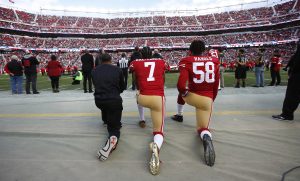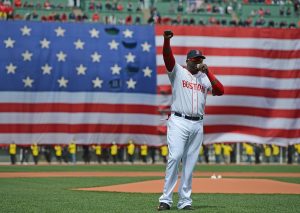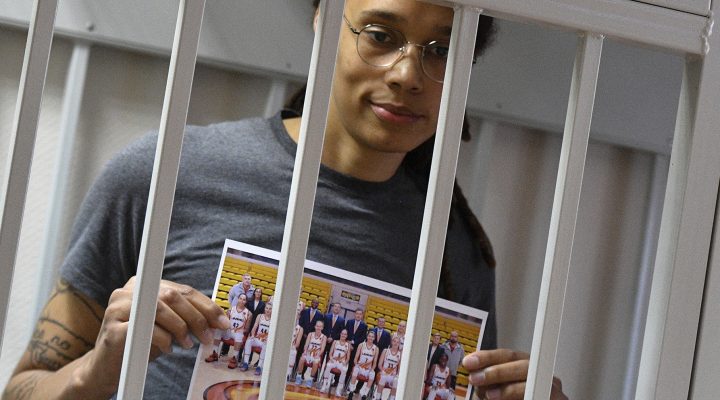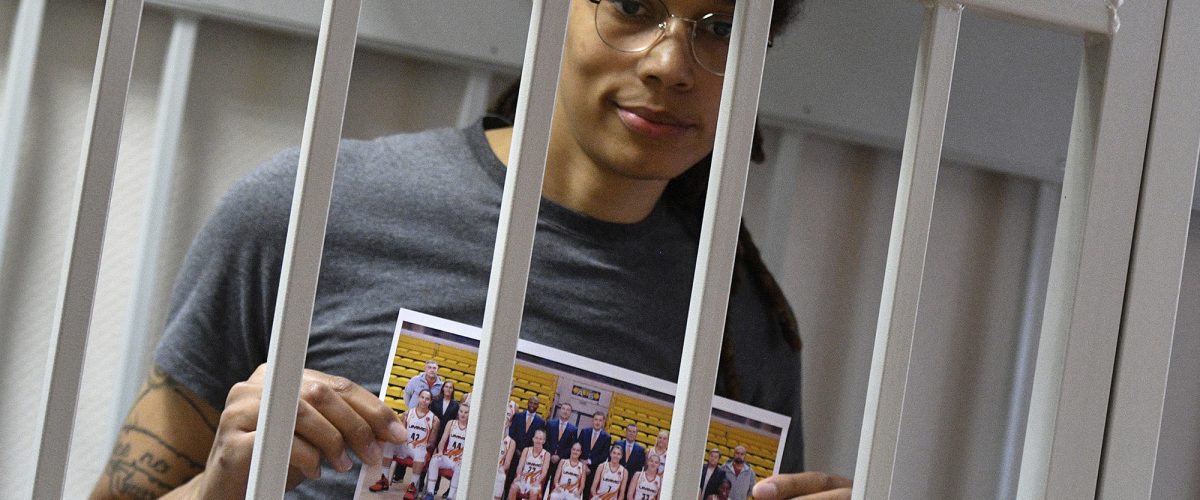Brittney Griner is a professional basketball player. Her story reads like the all-American girl she is, but now she is in a Russian prison, and her critics are saying she is “unpatriotic,” “un-American,” and not worthy of our mercy and grace. Is this because she is African American? Is it because she is not heterosexual?
Griner was born in Houston, the daughter of Raymond and Sandra Griner. Her father is a former Harris County sheriff and Marine veteran who served in Vietnam in 1968 and 1969. She has three older siblings.
On April 3, 2012, Griner led Baylor with 26 points, 13 rebounds and five blocked shots to win the Division I Women’s Basketball Championship, 80–61 over Notre Dame. Griner was named the Final Four’s Most Outstanding Player. Baylor finished its undefeated season with 40 wins, the most in NCAA history.

Baylor center Brittney Griner (42) blocks a shot attempt by Iowa State guard Nikki Moody (4) during their NCAA college basketball championship game in the Big 12 Conference tournament, Monday, March 11, 2013, in Dallas. Baylor won 75-47. (AP Photo/Tony Gutierrez)
In 2016, she played for the U.S. Olympic women’s basketball team at the Summer Olympics and earned her first Olympic gold medal as they beat Spain 101–72 in the final, becoming one of 11 players who have earned an Olympic gold medal, FIBA World Cup gold medal, WNBA title, and NCAA title, joining Sue Bird, Swin Cash, Tamika Catchings, Cynthia Cooper, Asjha Jones, Maya Moore, Breanna Stewart, Sheryl Swoopes, Diana Taurasi, and Kara Wolters on the list. Griner was selected for her second Olympics in 2021, going undefeated and winning the gold medal as part of Team USA.
Hatred for Black athletes
This, of course, is not the first time an African American athlete has been treated badly by so many of our fellow citizens. Some portion of America hates Black athletes, according to Stephen A. Crockett in the Washington Post: “It doesn’t just ignore them; it disrespects the sports they play and claims they aren’t as skilled as their male counterparts.”
“This is about more than one woman basketball player; this is about how society has treated athletes of color.”
This is about more than one woman basketball player; this is about how society has treated athletes of color who are considered out of place, speak out of turn or cause unwanted trouble. When an athlete of color violates a social and/or sporting norm of decorum, they face harsh repercussions.
Famously, sprinters Tommie Smith and John Carlos, who bowed their heads and raised gloved fists during their medal ceremony at the 1968 Olympics, were labeled as rude and disrespectful and even received death threats for their breech of decorum.
Seattle Seahawk Richard Sherman was called a “thug” and worse for being outspoken on social issues beyond “mere sports.”
And then-National Football League quarterback Colin Kaepernick’s anthem-kneeling protest against police brutality produced a virile form of vitriol against him. This demonstrates the ongoing risk an athlete of color faces when engaging in even the most peaceful forms of ceremonial disruption.
Hatred accelerated by Trumpism
This has more to do with the racist rhetorical environment created by Donald Trump since 2015 than anyone else. Trump convinced “real Americans” that they were being insulted and their dignity was being besmirched by African American athletes protesting racial injustice by refusing to stand for the National Anthem. He then insisted he is the only person who can give America back her dignity, pride and greatness.

Eric Reid #35, Colin Kaepernick #7 and Eli Harold #58 of the San Francisco 49ers kneel on the sideline during the anthem, prior to the game against the Seattle Seahawks at Levi Stadium on January 1, 2017, in Santa Clara, California. (Photo by Michael Zagaris/San Francisco 49ers/Getty Images)
Trump and his followers frequently have flung scorn at athletes protesting racial injustice. At a September 2017 rally, for instance, Trump proposed that a team owner’s response to a protesting player should be “Get that son of a bitch off the field right now, he’s fired!”
“For a week,” Trump continued, the owner would “be the most popular person in this country. Because that’s a total disrespect of our heritage. That’s a total disrespect for everything we stand for.”
In an interview with Fox and Friends eight months later, immediately after a new NFL policy banning all players who engaged in protest, Trump reiterated that players who refused to abide should be removed from the U.S. altogether: “You have to stand proudly for the national anthem or you shouldn’t be playing, you shouldn’t be there. Maybe you shouldn’t be in the country.”
This rhetorical mechanism is the epitome of Trump’s method. Taking the side of whites who have been confronted with their complicity in a system of racial disparity, he assures them that rather than feeling ashamed, they should take revenge on those who have sought to challenge their sense of ease. A racialized strategy is skillfully converted into an emotional battlefield, mobilizing “real Americans” and “patriots” against those who “disrespect” the National Anthem.
“The trouble, in other words, is not in the athlete’s protest, but in the audience’s prejudices.”
Rhetorically, almost no one makes the distinction that the athlete’s message may be more nuanced than the audience’s prejudices and expectations. The trouble, in other words, is not in the athlete’s protest, but in the audience’s prejudices.
The audience, however, primed to believe that national dignity has been dishonored, has been quick to pass judgment on the athlete as an agitator, a political troublemaker. And this has been the case even when African American preachers have dared to speak a word that sounded “anti-American.”
MLK and David Ortiz
Perhaps no preacher has ever received such universal condemnation for a sermon than did Martin Luther King Jr. for his sermon against the Vietnam War. And you would think Jeremiah Wright was Benedict Arnold for his bold, gospel, truth-telling sermon that insisted America’s sins against Native Americans and African Americans deserved the words, “Not God bless America, but God damn America.”
“There’s a portion of America that will not accept criticism from an African American professional athlete or preacher.”
This may be the only sermon that almost cost a presidential candidate an election. Barack Obama gave a speech in Philadelphia where he felt obligated to repudiate his pastor, the pastor who married him to Michelle, and the pastor who baptized his children. There’s a portion of America that will not accept criticism from an African American professional athlete or preacher.
Perhaps the closest our nation has ever come to a full-throated endorsement of a civic violation was the speech given by David Ortiz.
John W. Jordan, in “Profanity from The Heart as Exceptional Civic Rhetoric,” describes the event: “On April 20, 2013, the day after a city-wide manhunt for the Boston Marathon bombers ended, the Red Sox were to play a home game at historic Fenway Park, immediately following a pre-game ceremony honoring community heroes. Against the backdrop of an enormous American flag draped across Fenway’s iconic ‘Green Monster’ outfield wall, members of the police, first responders and survivors paraded onto the field to receive thanks and ovations from the crowd.

David Ortiz #34 of the Boston Red Sox addresses the crowd before the start of a game against the Kansas City Royals on April 20, 2013, at Fenway Park in Boston. (Photo by Michael Ivins/Boston Red Sox/Getty Images)
Unexpectedly, Boston’s beloved slugger David “Big Papi” Ortiz also walked onto the infield with a microphone in hand and delivered an impromptu address. Here is what he said:
This jersey that we wear today, it doesn’t say Red Sox. It says Boston. We want to thank you Mayor Menino, Governor Patrick, the whole police department for the great job that they did this past week. This is our f-ing city and nobody is going to dictate our freedom. Stay strong.
Yet even Ortiz faced criticism for his use of the “F-word.” Even in the most highly charged patriotic moment of this century, when flag-waving and the National Anthem were accorded the highest of accolades, even then Ortiz was severely criticized for his language. African American athletes are always swimming upstream in a toxic, systemic racist culture.
Griner and Christian nationalism
What does Brittney Griner have to do with Christian nationalism, “real Americans,” racism, homophobia, patriotism and faith? That’s a lot of cultural weight to put on the shoulders of a basketball player.
She currently sits in a Russian prison where she has been sentenced to nine years for possession of an illegal drug — cannabis oil. Legal issues in Russia aside, why have so many leaders been silent about Griner’s fate? It turns out that the issues previously mentioned are playing a large role in the silence. This is not as much about Griner as it is about the grinding pernicious influence of Christian nationalism as it worms its way into the heart of our nation’s soul.
“This is not as much about Griner as it is about the grinding pernicious influence of Christian nationalism as it worms it way into the heart of our nation’s soul.”
There are people pushing for Griner’s release. They are not politicians or preachers. Professional athletes are advocating for the release of Brittney Griner. Griner’s detention has become a focal point for high-profile American athletes. For example, Megan Rapinoe, Steph Curry and LeBron James have called upon Americans to stay focused on Griner’s release.
My interest lies with the lack of response by Baptists. That includes me. After more than 150 days, I have said nothing until now. I’ve complained about it to friends but taken no rhetorical risks from my pulpit. I repent of this sin of omission and do here and now offer restitution. Repentance is posturing unless there is reparation.
Historically, no one has a greater respect for advocating for freedom, for rights, for the persecuted, the wrongly arrested, detained and martyred than Baptists. The history of Baptists has been written in blood. From Thomas Helwys dying in an English prison to Martin Luther King Jr. being gunned down in Memphis, Baptists have been on the front line of advocating for others.
Now, there’s a rising concern that Baptists have lost our nerve. We are retreating from the separation of church and state. We are not stepping up to confront systemic racism but are hiding behind terms like “Replacement Theory,” “wokeness,” and “Critical Race Theory.” Some of us are promoting revisionist American history that distorts our national flaws and manifold wickedness. Baptists, of all people, are leading the charge to destroy the wall of separation between church and state. We have lost our “starch.” And whether we will be getting it back again is not an easy question to answer.
Where are the Baptists?
My question is: Where are the Baptists advocating for Griner? She played at Baylor University — a Baptist school. In our culture, Baptists and sports are a linked pair. Griner helped Baylor win a national championship in NCAA women’s basketball.
Baylor University did release a statement: “It’s been more than 140 days since Brittney Griner was wrongfully detained in Russia. The Baylor family stands with Brittney, and it’s time to bring her home.”
Yet not everyone in the “Baylor family” was happy with this stance. Baylor’s Twitter account had some furious pushback. For example, “So it’s OK with Baylor for someone to ignore the laws of a country they are visiting? Nice to know.” Another disagreed vehemently: “No. She broke the law. She pled guilty. She has said she will not honor our National Anthem.”
“I am part of the ‘Baylor family’ and I don’t stand with Brittney because she does not stand for the U.S. flag.”
And there’s this telling rebuttal: “I am part of the ‘Baylor family’ and I don’t stand with Brittney because she does not stand for the U.S. flag. Actions have consequences. Too bad Baylor did not help her learn that earlier!”
Themes develop in the angry tweets: Law and order, patriotism and the American flag. These are all huge principles in the Christian nationalism movement that is more nativist than Christian. Some online responses:
- “The anti-American all the sudden needs America?”
- “I got no sympathy for drug users.”
- “She broke the damn law lol.”
- “Look ‘her’ neck! What does she have that no other women has?”
The racism that sticks its ugly nose into the debate shows in the attempt to make villains of athletes protesting racial injustice by refusing to stand for the national anthem: “The same woman who refused to let the National Anthem play at WNBA games and now she’s screaming for the evil USA to save her.”
According to the people who want Griner to serve a 10-year prison sentence in a Russian prison, she is not a “real American.” She is unpatriotic. She is a criminal and a drug user. She has no right to plead for mercy.
The highest percentage of the negative tweets insist that Griner broke the Russian law. Therefore, in their view, she had to be punished. Where is this stubborn insistence on how to treat people accused of breaking the law on January 6? What do these law-and-order folk say about Donald Trump’s breaking of the laws of the United States? Nothing. There’s no mercy in the cries for Griner to face the consequences of her alleged actions.
In looking for support for Griner among Baptists, since I am Baptist and Baylor is a Baptist university, I could not find any sermons by Baptist preachers advocating for Griner’s release. There are plenty of sermons about Christians being persecuted in foreign countries, but nothing on behalf of a fellow American. I found one editorial by Bill Whitaker in the Waco Herald Tribune that made the case for Griner. I did not discover any editorials on behalf of Griner in any of the state Southern Baptist newspapers.
Americans learned on the Fourth of July that President Biden had received a handwritten letter from Griner in which she wrote: “I’m terrified I might be here forever.”
Whitaker wrote: Two of my friends — both Trump supporters and veterans — cavalierly dismissed Griner’s plea for freedom, given her refusal to participate in the National Anthem during WNBA games in 2020 when many Americans (including in Waco) protested against a clear pattern of police brutality involving African Americans nationwide, symbolized by the death of former Texan George Floyd.
“Because she’s Black and gay, she deserves to rot in a Russian prison as if she’s Jane Fonda consorting with the Viet Cong.”
“In short, some believe because Griner’s views on race and law enforcement are possibly different from yours or mine, and possibly also because she’s Black and gay, she deserves to rot in a Russian prison as if she’s Jane Fonda consorting with the Viet Cong.
“Yet while some Americans condemn Griner and Kaepernick for protesting the police brutality visited upon U.S. citizens of color, they cheer the June 27 Supreme Court opinion that a Washington state school district violated the First Amendment rights of a fired high school football coach who publicly prayed at the 50-yard line after games. Not all public and peaceful demonstrations of belief, it would seem, are created equal.”
There should be red flags about the arrest and imprisonment and now conviction of Brittney Griner. If she were Tom Brady, Brett Favre, Peyton Manning or a lot of other white male heroes, the cries already would have filled the universe. Mountains would have been moved.
I’m a Baptist pastor and I am offering a defense for Brittney Griner. A full-orbed defense as surely as loud and persistent as any Baptist defending someone falsely imprisoned. She is one of us. She played ball for us. She brought fame and recognition to Baylor University. She won Olympic gold — twice. She’s an American. We are not leaving her to rot in a Russian prison. Putin is our enemy, not our friend. He is the enemy of the world. Britney Griner is an American, and she deserves our support.
Rodney W. Kennedy currently serves as interim pastor of Emmanuel Freiden Federated Church in Schenectady, N.Y., and as preaching instructor Palmer Theological Seminary. He is the author of nine books, including the newly released The Immaculate Mistake, about how evangelical Christians gave birth to Donald Trump.
Related articles:
Baylor drops language referring to ‘homosexual acts’
Kenneth Starr is doing it again | Opinion by Alan Bean
Kaepernick and Jefferson: Standing for the right to kneel | Opinion by David Jordan


